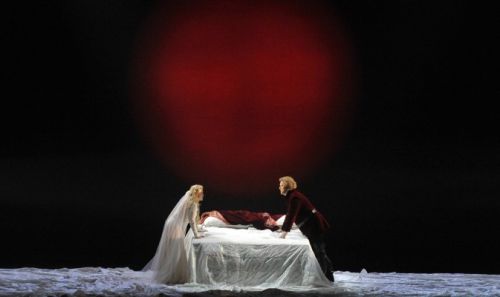Verdi: Il Trovatore, La Fenice Orchestra and Chorus, Daniele Rustioni (conductor), Teatro La Fenice, Venice, 20.9.2014 (JMI)

Cast:
Manrico: Gregory Kunde
Leonora: Kristin Lewis
Azucena: Veronica Simeoni
Count Luna: Artur Rucinski
Ferrando: Roberto Tagliavini
Ines: Lucia Raicevich
Ruiz: Ciro Passilongo
Production: La Fenice in co-production with Teatro Regio di Parma
Direction: Lorenzo Mariani
Sets and Costumes: William Orlandi
Lighting: Christian Pinaud
This trip to Venice was essentially planned to attend the debut of Gregory Kunde in the character of Manrico, but that event had very good company. The day before there was La Traviata directed by Robert Carsen, and the following day we had Rossini’s L’Inganno Felice. A very promising weekend but, unfortunately, my flight from Barcelona was delayed, and I reached Piazza San Marco too late to attend Traviata.
For Gregory Kunde’s debut, La Fenice staged the production by Lorenzo Mariani that was performed here three years ago. Its premiere took place in October 2010 at Parma during the Verdi Festival, and I reviewed it then. My impression is no different now, although the candles in Act III no longer exist: http://www.musicweb-international.com/sandh/2010/Jul-Dec10/trovatore1810.htm
Daniele Rustioni was in charge of the musical direction, and his reading was better than I expected. Less than a year ago he conducted this opera at La Scala, and I found his reading routine and flat. I don’t know if theatre fears exist among conductors, but the truth is that Daniele Rustioni was much better in Venice, more alive, more tense and, if you will, more Verdian. He was always supportive of the singers, and they had no problems taking advantage of the theatre’s magnificent acoustics. There were excellent performances from both orchestra and chorus and, unlike in Parma, here every cabaletta was repeated.
The biggest draw for me was to hear Gregory Kunde sing Manrico. It is surprising that this tenor, at 60, is so sought after in the heavier Verdi repertoire. I’ve had the opportunity to see him in Spain in La Forza del Destino, Otello and Les Vêpres Siciliennes and as Gualtiero in Il Pirata. And all this in less than two years. Now he comes to Manrico and it works, but less than I expected. There’s no doubt that the voice is there, as is the singer, but his “Ah, si ben mio” fell short of brilliance and emotion. The always much anticipated “La Pira” was sung with courage and without reservation, but his top C was rather short. He made up for it with a remarkable final act.
Soprano Kristin Lewis was Leonora, and I did not find her very convincing. She started off fine with “Tacea la notte placida,” but in the following cabaletta her weaknesses emerged. Her top register is limited and tight, and she lacks consistency below. Apparently, Carmen Giannatasio was better in earlier performances here.
Veronica Simeoni was a correct Azucena, but think the character requires a more dramatic voice. Ms. Simeoni is an excellent singer, but she is not a dramatic mezzo soprano. Considering that she is supposed to be Manrico’s mother on stage, they should have done something to make her appear older: she looked more like Manrico’s daughter than his mother.
Artur Rucinski is one of the few true Verdi baritones today, but I wasn’t convinced by his Count di Luna. It’s not because of his voice, which is well suited to the role, but for his efforts to show off its size without paying attention to nuances.
I liked Roberto Tagliavini in the part of Ferrando very much. His voice is excellent, but it gets whitish at the top. That went unnoticed here.
In the secondary characters, Lucia Raicevich and Ciro Passilongo were fine as Ines and Ruiz.
La Fenice was sold out. The audience was warm during the performance, with cheers at the final bows for Kunde, Simeoni and Rucinski. Maestro Rustioni was also cheered.
José Mª Irurzun